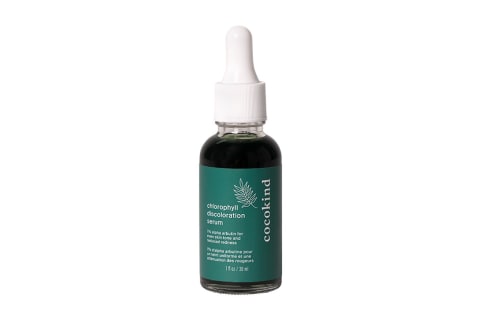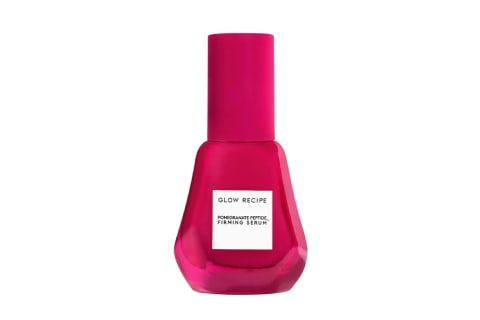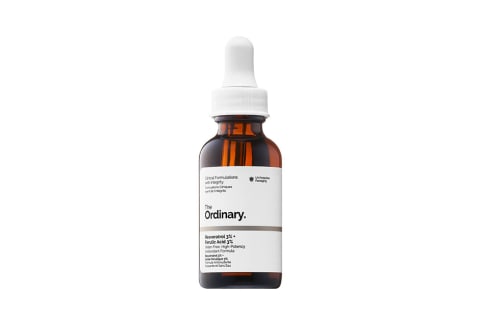Advertisement
Behold: The Buzzy Skin Brighteners Coming For Vitamin C's Crown


Confession: I haven't used a vitamin C serum in months.
Nothing against the classic antioxidant! It's beloved for a very science-backed reason! And if you asked me a year ago whether I'd give up my trusty skin-brightening formula, I would have scoffed and shown you my stubborn dark spots.
It's non-negotiable for an even-toned glow, I'd say. Retinol, vitamin C, and sunscreen: the dermatologist-approved darlings in skin care.
But derms have recently become more forgiving of routines sans classic C—especially ones that swap in other buzzy skin brighteners.
These alternative antioxidants are becoming increasingly popular, namely for people who cannot tolerate vitamin C (plus those who just want to go the extra mile for radiant skin). Ahead, discover a few star players that receive derm endorsement.
Can your skin tolerate vitamin C?
"Common signs of vitamin C intolerance include redness, itching, stinging, or a burning sensation upon application," explains board-certified dermatologist Ife J. Rodney, M.D., founder of Eternal Dermatology. "Less recognized signs could include small bumps, hives, or worsening of existing skin conditions like eczema or rosacea."
Some people (like me) can even experience breakouts—in fact, acne was the only symptom I had, which made it difficult to pinpoint what, exactly, was causing this inflammation. I had some suspicions, so I eliminated every potentially irritating active in my routine, save for the vitamin C. Lo and behold, I had found the culprit.
I suggest committing to a similar "elimination routine" if you think you might be dealing with a sensitivity. Or, as Rodney suggests, you can try a patch test: Apply a small dot of product daily near your ear or underside of your arm, then monitor it for a few days for any changes. Of course, you can also consult a dermatologist for a more personalized read.
OK, but here's the thing: Vitamin C comes in many derivatives, ranging instability. L-ascorbic acid is the most potent (and unstable) form of the antioxidant, and it's this type that causes the most sensitivities. Other forms include magnesium ascorbyl phosphate, tetrahexyldecyl (THD) ascorbate, ascorbyl palmitate, sodium ascorbyl phosphate, and ascorbyl tetraisopalmitate.
Both ascorbyl-6-palmitate and magnesium ascorbyl phosphate are stable at neutral pH1, which may make them gentler on the skin. Similarly, "THD ascorbate is less irritating, more stable, and can easily be used in oil-based products," notes board-certified dermatologist Hadley King, M.D. (Feel free to brush up on your vitamin C knowledge here.)
So, just because you can't tolerate l-ascorbic acid doesn't mean you must swear off vitamin C in general. Again, this is not a scathing review of vitamin C—I adore the collagen-boosting antioxidant. When I stick to gentler, more stable serums, my skin thrives! When I ingest vitamin C supplements (even high-potency, ascorbic acid formulas), my complexion glows!
It's just topical ascorbic acid that gives me (and plenty of others) some pause. For this reason, some formulators are focusing on other brightening actives, fit for the most sensitive-skinned folks.
Other buzzy antioxidants
Granted, these brightening antioxidants don't have nearly as much data behind them as vitamin C. "Vitamin C plays a unique role in inhibiting melanin production, which contributes significantly to skin brightening," says Rodney. That's not to say these other players won't yield results, but the mechanism behind them isn't as clear—so they may differ from person to person.
"It's also worth pointing out that antioxidants play well together—they can help to stabilize each other in formulations," notes King. That said, it's not a bad idea to add the following antioxidant-rich actives to your routine, whether you're a vitamin C loyalist or otherwise:
Chlorophyll
Chlorophyll, you may know, is a pigment naturally produced by plants and algae and gives them their characteristic green color. But were you aware of its significant antioxidant effects2?
In addition to fighting off free radicals, these properties "may help reduce inflammation and redness, promoting an even skin tone," says Rodney. King seconds the claim, praising chlorophyl's anti-inflammatory and antibacterial abilities3. One small study of 24 participants4 even found topical chlorophyll was associated with a reduction in acne, less severe acne lesions, and even lower sebum levels.
Astaxanthin
"Astaxanthin is a potent antioxidant, possibly more powerful than vitamin C," says Rodney. (In fact, data shows it's a whopping 6,000 times more potent.) "It can protect the skin from free radical damage, improve elasticity, and enhance skin hydration, contributing to a radiant complexion," she adds.
King references a study in which a combination of topical and oral astaxanthin was shown to smooth wrinkles, brighten age spots, and help maintain skin moisture. "Studies indicate that it works with other antioxidants to boost their potency," King adds, which is why some vitamin C serums also feature astaxanthin in their formulas. Or if you'd like to double down and take the ingestible route, feel free to read more about astaxanthin supplements here.
Polyphenols
Finally, polyphenols (resveratrol, pomegranate extract, and the like) also have anti-inflammatory and antioxidant properties. A 100% pomegranate whole-fruit extract, for example, boasts at least 60% total polyphenols5.
These polyphenols are major players in the skin aging space, as these powerful micronutrients have been shown to protect your body's cells (including skin) from free radicals, which can lead to premature aging in the skin. "They can help even out skin tone, reduce redness, and protect the skin from environmental damage, promoting a healthy glow," says Rodney.
Resveratrol, or the colorful compounds that give raspberries and red wine their deep hue, has even been shown to help manage UV-induced skin damage6 (dark spots, fine lines, and the like).
The takeaway
Vitamin C is a staple ingredient in skin care, and it's not going anywhere. That being said, you can prioritize other antioxidants and still reap the skin-brightening benefits, especially if you think you might be sensitive to C. Regardless, extra antioxidants are a sound investment, so go ahead and glow on.
6 Sources
- https://www.ncbi.nlm.nih.gov/pmc/articles/PMC5605218/#B6
- https://lpi.oregonstate.edu/mic/dietary-factors/phytochemicals/chlorophyll-chlorophyllin#antioxidant-effects
- https://link.springer.com/article/10.1007/s10753-011-9399-0
- https://pubmed.ncbi.nlm.nih.gov/24930587/
- https://www.ncbi.nlm.nih.gov/labs/pmc/articles/PMC7481211/
- https://www.ncbi.nlm.nih.gov/pubmed/18221451


